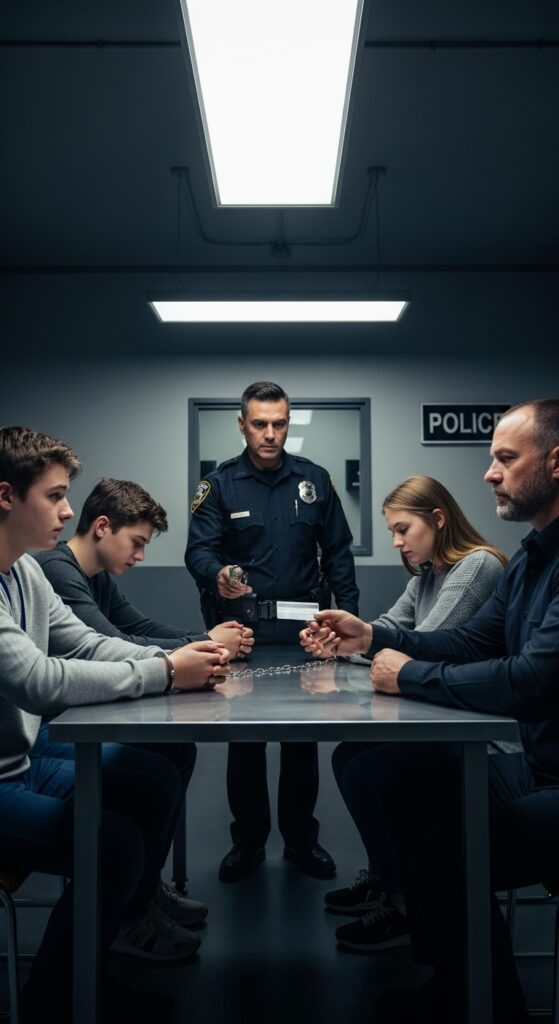My kids thought they outsmarted me with my credit card, splurging on luxury items and trying to cover their tracks. But I turned the tables—and gave them the harshest lesson of their lives.
A Mansion Built on Sacrifice
The Harrington estate wasn’t a simple residence—it was a monument. Rising from the hills above Malibu, the house was a study in sharp glass walls, brushed steel, and sleek stone terraces that glimmered in the California sun. Visitors gasped at its perfection, assuming it was inherited wealth. But in truth, it was the creation of one woman: Isabella Harrington, one of the most celebrated designers of her generation.
Isabella’s career had been built on resilience. Every polished surface and every innovative design in her home represented decades of persistence, late nights, and sacrifices. But while the mansion was flawless, the family within was fractured.
Her two children, Damien, 21, and Ava, 18, were reflections of modern privilege gone wrong. Handsome, fashionable, and endlessly shallow, they lived through their phones. Their worth was measured in followers, luxury tags, and vacations on other people’s yachts. They were raised in abundance but blind to the meaning of work, effort, or cost.
Isabella tried—desperately—to steer them toward responsibility. She called family meetings at the marble kitchen island, urging them to think beyond their trust funds.
“This isn’t real life,” she said one evening, exhaustion in her voice. “The house, the cars, my career—it all comes from hard work. You need to start creating something for yourselves.”
Ava rolled her eyes, scrolling Instagram. “Please, Mom. We’re not going to waste time with summer jobs. That’s ridiculous.”
Damien smirked, smug and dismissive. To them, her words were background noise. Her achievements weren’t inspiration; they were simply resources for their consumption.
The Hidden Watchers
A few weeks earlier, Isabella had installed an advanced home security system. Micro-cameras hid seamlessly in corners of the house. She told her kids it was for protection against burglars. They barely registered her explanation.
What they didn’t know was that the cameras weren’t meant to catch outsiders. They were meant to record the betrayal Isabella feared was already festering inside her own family.

A Calculated Theft
It happened on a Tuesday night. The house slept under silver moonlight. From her hidden security feed, the camera caught it all:
Damien and Ava tiptoed down the grand staircase, shadows gliding across the polished concrete. They moved with precision, almost ritualistic. At the console table by the front door rested Isabella’s purse. Damien’s hand slipped inside, drawing out the sleek, black credit card that powered their mother’s success.
He held it up in the dim light. Ava’s lips curved into a smile. A silent high-five sealed the conspiracy. Then, as silently as they had descended, they disappeared back upstairs—certain of their triumph.
The First Clue
The next morning, while Isabella was locked in a tense design presentation for a new gallery, her phone buzzed with a text.
Transaction Alert: $16,490 – Beverly Hills Boutique
Her chest tightened. She quietly opened her purse. The slot for her main card was empty.
That afternoon, an email arrived: Your request to report your card as lost has been processed.
The realization was instant and sickening. Her children had stolen it, used it, and filed the report to erase their tracks. They believed they were clever. They believed she was blind.
But Isabella wasn’t blind.
The Breaking of a Mother
That evening, Damien and Ava breezed into the kitchen with the casual arrogance of the untouchable.
“Hey, Mom,” Ava chirped, tossing her bag on the counter. “What’s for dinner?”
The normalcy was unbearable. They had betrayed her and then returned home as if nothing had happened. At that moment, something inside Isabella hardened. The soft, forgiving part of her heart calcified into resolve.
Later, she sat alone in her office, replaying the security footage. She watched the theft again and again, their grins glowing in the blue light of the screen. These weren’t children making mistakes. These were criminals practicing deceit.
And she knew: this wasn’t a lecture moment. This was a law moment.
Outsmarting the Outsmarted
The next morning, Isabella called the credit card company. Her voice was level.
“My card wasn’t lost. It was stolen. I want a full investigation, and I will press charges.”
Three days later, the doorbell chimed.
Two officers from the Malibu Sheriff’s Department stood at the glass entryway.
“We’re looking for Damien and Ava Harrington.”
The siblings, puzzled but arrogant, stepped forward. Within minutes, their faces twisted from confusion to horror as the officers produced handcuffs.
Their eyes darted to their mother. She stood at the far end of the hall, watching silently, her face unreadable. For the first time in their lives, she wasn’t intervening. She wasn’t rescuing. She was letting justice speak.
And it did.
The Aftermath
At the station, Damien made his one call. His voice shook with rage and desperation.
“Mom! Get us out of here! Call a lawyer, pay the bail!”
Isabella’s reply was quiet, final.
“No, Damien. These are your choices. And now, your consequences.”
The silence that followed was heavier than any scream. She ended the call.
Lessons in Reality
The legal proceedings were brutal. Their crimes, originally charged as felonies, were bargained down to misdemeanors in exchange for guilty pleas. Their sentence: probation, 500 hours of community service, and full repayment of the $16,490 they had stolen.
The transformation was swift.
Damien, once dreaming of quick riches, now pulled dawn shifts at a coffee shop, scrubbing counters and steaming milk. Ava, who once sneered at “ordinary people,” now folded clothes in a retail store, her uniform an itchy polyester shirt. Their wages, meager but real, went directly into restitution.
For the first time in their privileged lives, they had to work for something.
A Fragile Reconciliation
Months later, Isabella sat in her office when two texts arrived.
From Ava: “Mom, I’m sorry.”
From Damien: “We’re sorry.”
She stared at the screen, a single tear sliding down her cheek. She didn’t reply—not yet. Their apologies were not manipulations this time. They were raw, tentative acknowledgments of reality.
Perhaps the relationship could be rebuilt. Perhaps not. But for the first time, the foundation would be real: respect, accountability, consequence.
Closing Reflection
My kids thought they outsmarted me with my credit card—until I outsmarted them.
They believed privilege was protection. They believed deceit was cleverness. But they forgot the simplest truth: you cannot cheat responsibility forever.
And sometimes, the only way to love your children is to stop protecting them from the world—and let the world teach them what you cannot.


